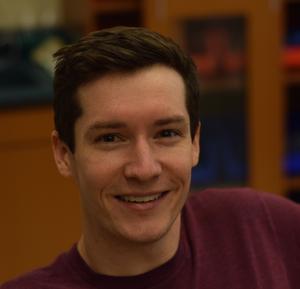ESP Biography
JESSE MARSHALL, Stanford Neurophysicist
|
Major: Physics College/Employer: Stanford Year of Graduation: G |

|
Brief Biographical Sketch:
I'm an applied physicist and biologist who loves to think creatively about the brain, cooking and behavior. Past Classes(Clicking a class title will bring you to the course's section of the corresponding course catalog)B4566: Trees of Stanford in Splash Fall 2015 (Nov. 07 - 08, 2015)
Trees provide us with food, water, shelter, paper, fuel and climate stability. There are 3 trillion trees on the planet and are over 400 species on Stanford's campus. That's not even including the mascot! Yet how many can you identify. In this class, we'll wander about Stanford's quad examining the local tree population, snacking on the fruits of trees and do experiments on their leaves, bark, and seeds. We'll use the trees to transport ourselves to Africa, South America, Australia, Asia and Europe, and learn about fascinating biology and environmental science along the way!
B4147: The (Personalized) Genomic Revolution in Splash Spring 2015 (Apr. 11 - 12, 2015)
DNA and RNA are the molecules that code for all life. Much of our appearance, feelings and behavior is hard wired into our genetics, making understanding of the genome an important goal for biologists and doctors around the world. The Human Genome Project first sequenced the human genome fifteen years ago, at a cost of $3,000,000,000 dollars. Since then, the cost has now dropped to ~$1000! This has created an enormous possibility for doctors and scientists to understand the genetic nature of disease and tailor treatments to those with specific genetic mutations -- a revolution that is sure to last for decades to come.
B4021: Good Brains Gone Bad in Splash Fall 2014 (Nov. 08 - 09, 2014)
We all want to understand how the brain works. Scientists want to model brain function to understand our behavior. Doctors want to cure diseases like Alzheimer's and autism. Computer scientists want to model the brain in order to recognize cats on the internet. However how the brain works still remains mysterious. Much of our knowledge has come from fascinating case studies: people with personality changes, short term memory loss, and uncontrollable movements. Here I'll give a whirlwind overview of some remarkable patients that have transformed how we think of the brain and ourselves.
B2156: The Miracle of Taste in Splash! Spring 2012 (Apr. 21 - 22, 2012)
How do we taste? Why is sweet 'sweet' and sour, well, 'sour'? In this class we'll delve into the science of taste - how taste buds work and how chemical reactions going on in our mouth get sent to the brain. Along the way we'll eat things, eat things blindfolded, and consume 'miracle berries', which turn your tastebuds upside down and turn sweet to sour, sour to sweet.
P1762: Climate Change - Facts and Fictions in Splash! Fall 2011 (Oct. 29 - 30, 2011)
The earth is getting warmer. Tropical Glaciers are melting. Species are migrating. The oceans are getting more acidic. But why isn't anyone doing anything about it? What should we do about it?
We'll use fun demonstrations and examples to explain the facts behind global warming, debate the controversy and discuss what our next steps as a global society should be.
B1325: Light! Sight! The science of how we see. in Splash! Spring 2011 (Apr. 16 - 17, 2011)
Vision is our most important and best understood sense. We will explore the basic science behind how we see, and along the way play with optical illusions, tricks of the eye and other exciting games!
S1060: Savory, Sweet, Heat! The science of food. in Splash! Fall 2010 (Nov. 13 - 14, 2010)
Ever wonder what happens when an egg cooks or soda fizzes? Or why those salty tortilla chips go so well with sweet chunky salsas? In a brief two hours we'll survey all things science about all things food, incorporating a mix of lecture, demonstration and hands on experiments (cooking!). We'll cover bits of neuroscience, chemistry and physics when explaining how different foods combine to become a succulent meal and in the end, everyone will end up full, and a certified molecular gastronomist.
|
|
